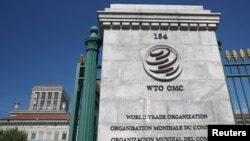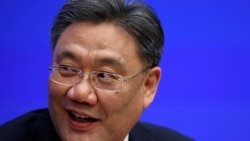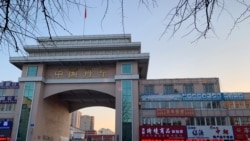The United States and a number of its closest allies have used a periodic review of China’s trade policy by the World Trade Organization to vent their anger at Beijing’s unwillingness to conform with rules meant to establish a level playing field for all participants in the global exchange of goods and services.
The regularly scheduled Trade Policy Review, which allows China’s trading partners to make official statements about policies to which they object, came last week as China marks 20 years of membership in the WTO, a group that works to establish rules for trade among its 164 member countries.
“When China acceded to the WTO 20 years ago, WTO members expected that the terms set forth in China’s Protocol of Accession would permanently dismantle existing Chinese policies and practices that were incompatible with an international trading system expressly based on open, market-oriented policies,” said David Bisbee, who is serving as the chargé d'affaires ad interim of the United States Mission to the WTO in Geneva.
“But those expectations have not been realized, and it appears that China has no inclination to change,” he continued in prepared remarks. “Instead, China has used the imprimatur of WTO membership to become the WTO’s largest trader, while doubling down on its state-led, non-market approach to trade, to the detriment of workers and businesses in the United States and other countries.”
U.S. not alone in complaints
The United States was far from alone in complaining about China’s failure to live up to its obligations under the WTO. Representatives from various governments around the globe catalogued a long list of ways in which they said China bends or breaks the rules.
Among other things, they said that China distorts markets by subsidizing state-owned firms, ignoring intellectual property rights, limiting foreign firms’ access to its markets, using forced labor in some manufacturing and agricultural sectors, coercing smaller governments to accept unfair trade practices, and more.
“By undermining agreed trade rules China also undermines the multilateral trading system on which all WTO members rely,” said George Mina, Australia’s ambassador to the WTO. “These rules have underpinned members’ growth and prosperity for decades. They protect the rights of members regardless of their size and power. China has assured members of its commitment to the rules-based order; but from our viewpoint there is a growing gap between China's rhetoric and its actions.”
João Aguiar Machado, the European Union’s ambassador to the WTO, recalled that China’s acceptance into the WTO had raised hopes of systematic reform of its economy.
“But the degree to which China has reformed and opened today is not commensurate with its weight in the global economy, or comparable to the access which China has to the markets of other WTO Members,” Machado said. “Moreover, the influence exerted by the state on China’s economic environment generates competitive distortions worldwide, leading to systemic problems for global trade.”
China responds
China's Commerce Minister Wang Wentao painted a very different picture of Chinese policy when he addressed the meeting. “Since the last review, China has stayed committed to deepening reform, expanding, opening up and growing its open economy at a higher level,” he said. "China has been reinforcing intellectual property protection by legislative, administrative and judicial means, and fulfilling its obligations on transparency.”
Chinese state-run media also put a vastly different spin on the meeting than the Western press.
The Chinese Communist Party-run Global Times ran a story with the headline, “China’s trade policies and practices praised at WTO.” The story contained none of the criticism leveled by China’s trading partners, saying only that they “firmly recognized China's role as a major driver of global growth, and country's contributions in lifting up other developing and under developed countries out of poverty, and expressed their gratitude over China's help in fighting against the COVID-19 pandemic.”
Experts expect little change
While the rhetoric and China’s Trade Policy Review was harsher than it has been in the past, and emanated from a larger number of countries than many expected, experts said that it was unlikely to prompt any significant change in Beijing’s policies. That is, in large part, because the WTO requires all major policy changes be made by consensus, making efforts to rein in China difficult or impossible to implement.
Petros C. Mavroidis, a Columbia University law professor and a legal adviser to the WTO, said that the body hearing the complaints last week has no authority to act on them. He also pointed out that China has become adept at remaining in technical compliance with many rules, even as it finds ways around them.
“China may not violate WTO rules, but it may violate WTO spirit,” he said.
Gary Hufbauer, a senior fellow at the Peterson Institute for International Economics, agreed that the review was mostly performative. “The criticisms are on the record, but it's not a negotiation. It's just what I would call a listening session,” he said.
He added that a serious commitment to pursuing change in China’s treatment under WTO rules would have to be driven by the U.S., but added that, in his opinion, the Biden administration “is not inclined to engage in deep WTO negotiations at this time.”
Yinan Wang contributed to this report.

















